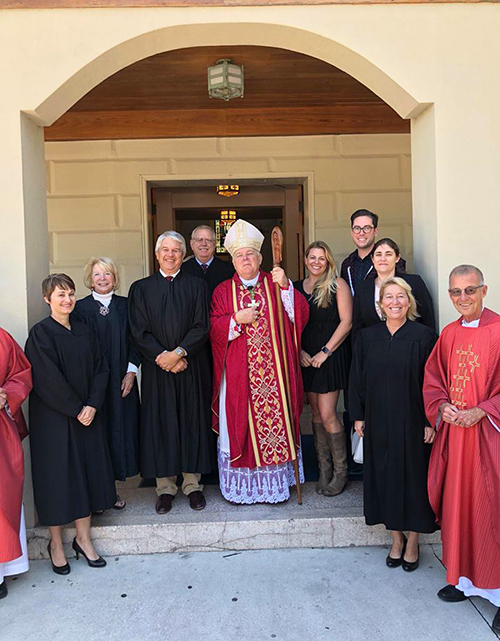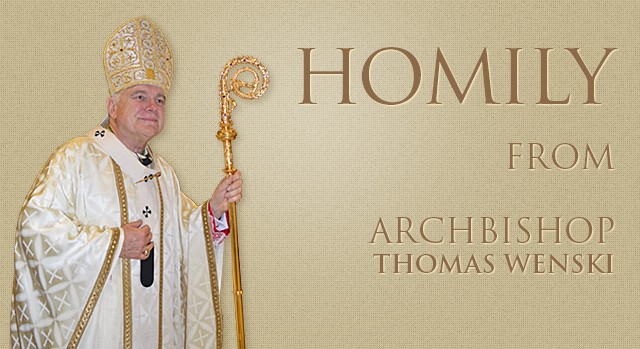By Archbishop Thomas Wenski - The Archdiocese of Miami
Archbishop Thomas Wenski preached this homily during the annual Red Mass for legal professionals in Monroe County. The Mass was celebrated March 9, 2018 at the Basilica of St. Mary Star of the Sea, Key West.
In today’s Gospel, a scribe approaches Jesus. The scribes were the lawyers of their day � at least the religious lawyers if not the civil lawyers of that time and culture. So, on this Lenten Friday, it is an honor for me to be here again in the presence of so many modern-day scribes � and together at this annual Red Mass we all wish to approach Jesus who today is available to us � through his Word and his Sacrament � as he was available to those scribes of long ago.

Photographer: From Facebook
Archbishop Thomas Wenski poses with Monroe County judges after annual Red Mass at St. Mary Star of the Sea Basilica in Key West. The noon Mass brought a goodly number of lawyers and parishioners to pray for Holy Spirit to guide members of the Bar in imitation of St Thomas More.
The prophet Hosea says in today’s first reading, “Straight are the paths of the Lord. In them the just walk; but sinners stumble in them.” In the light of these words, we can understand the urgency of the scribe’s question to Jesus in the Gospel reading: “Which is the first of all the commandments?” Jesus answers with the formula which even today makes up part of the daily prayer of every observant Jew, the Schema Israel. But in answering the scribe, Jesus joins love of God with love of neighbor. For as the Apostle John would later write, how can you say you love God whom you do not see, if at the same time you hate your neighbor whom you see. There is perhaps another commandment hidden in these two that Jesus joins into one � it is not spoken but implied in the words that Jesus said to that scribe for if we are “to love our neighbor as ourselves” then we must love ourselves. So, love God; love your neighbor, love yourself.
In fact, perhaps the reason people don’t love our neighbors as they love ourselves is that they don’t really love themselves very well. Look, those hoodlums who would mug an old lady and steal her purse, they don’t love her, to be sure. But they’re not stealing her purse because they have hungry kids at home to feed. No, I’d bet they had a drug habit to feed. Somebody using drugs is basically killing themselves with that poison. And if he’s doing that he must not love himself. He doesn’t love himself, so why would he love that old lady and leave her and her purse alone?
But forget about the drug-crazed hoodlum whose addiction might mitigate his culpability and look into our own hearts and souls. The grudges we nurse, the hatreds we stroke, the revenge we dream about � how much of this lack of love towards our neighbor is a reflection of our own lack of love and respect towards ourselves. Don’t we at times indulge in any number of self-destructive behaviors � and isn’t that because we don’t love or respect ourselves as we should? As somebody said, “Resentment is like taking poison yourself and then expecting the other person to die.”
To love your neighbor as you love yourself requires you to love yourself. Now, I’m not telling you to be egoistical, narcissistic or selfish. I am not giving you a recipe for hubris but in saying that you have to love yourself as made in the image and likeness of God, I am calling you to humility. If you do that, then the Golden Rule, do unto others as you would have them do unto you, makes sense. It’ll mean more than doing unto others before they do unto you.
God loves us, he created us and in Jesus Christ, he redeems us � not to love ourselves is to suggest that God doesn’t know what he’s doing. And that certainly is hubris.
Of course, Jesus perfects the law and prophets � and if the Old Testament law and prophets could be summarized as Jesus did for the scribe, Jesus gives us a new law, one that not only perfects the law and prophets, but is meant to perfect or complete us. This new law is like the old but with a twist. If the old law says love God and love your neighbor as you love yourself, the new law of Jesus � a law that he gives its finest expression at the Last Supper - is simple, Love one another, as I have loved you. Thus, Jesus becomes the measure of our love: If we want to know what love is, look at Jesus. In Jesus, love endures all, love forgives all.
There’s a Latin phrase, I believe from Thomas Aquinas, Nemo dat quo non habet. Nobody can give what he doesn’t have. Which is why we are here today: We come to the table of God’s Word and the altar of sacrifice. We know our wounds � our lack of love for our neighbor, not to mention our lack of love for those we may consider our adversaries, our enemies, and our lack of love for ourselves. This is why before we approach the banquet of the lamb, we pray: Lord, I am not worthy, say but the word and my soul shall be healed. If we are going to love as Jesus loves, we need Jesus. We seek his healing � and his forgiveness.
Lent � and we’re at about the halfway point of our Lenten journey � is a yearly reminder that as Christians, we are to stand before the Lord with humility not hubris, and so we ask the Lord to forgive our sins � not to bless them.
The Red Mass recalls the memory and invokes the intercession of a remarkable Catholic lawyer, who proved to be a “Man for all Seasons,” Sir Thomas More. In the year 2000, Saint John Paul II named Saint Thomas More the patron of statesmen and politicians.
At that time, John Paul wrote about Thomas More:
“His life teaches us that government is above all an exercise of virtue. Unwavering in this rigorous moral stance, this English statesman placed his own public activity at the service of the person, especially if that person was weak or poor; he dealt with social controversies with a superb sense of fairness; he was vigorously committed to favoring and defending the family; he supported the all-round education of the young. His profound detachment from honors and wealth, his serene and joyful humility, his balanced knowledge of human nature and of the vanity of success, his certainty of judgment rooted in faith: these all gave him that confident inner strength that sustained him in adversity and in the face of death. His sanctity shone forth in his martyrdom, but it had been prepared by an entire life of work devoted to God and neighbor.”
“Profound detachment”, “joyful humility”, “balanced knowledge of human nature”, “judgment rooted in faith”, “confident inner strength”, these are qualities that describe a great lawyer, a lawyer who, because he knew the judge of heaven and earth, could say, “I am the King’s good servant but I am God’s servant first.” May you aspire to that same greatness � as individuals and as officers of the court.

